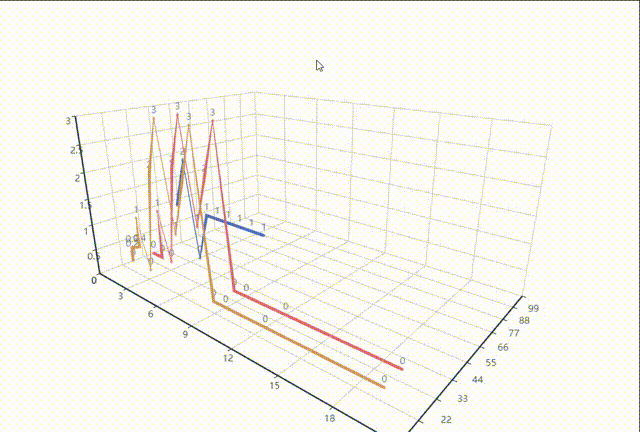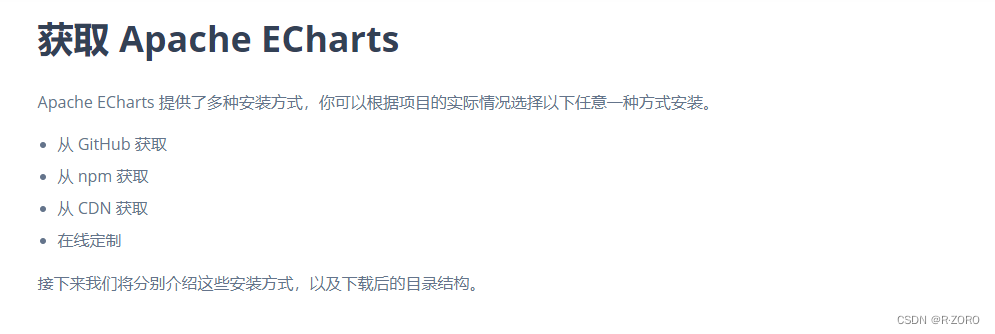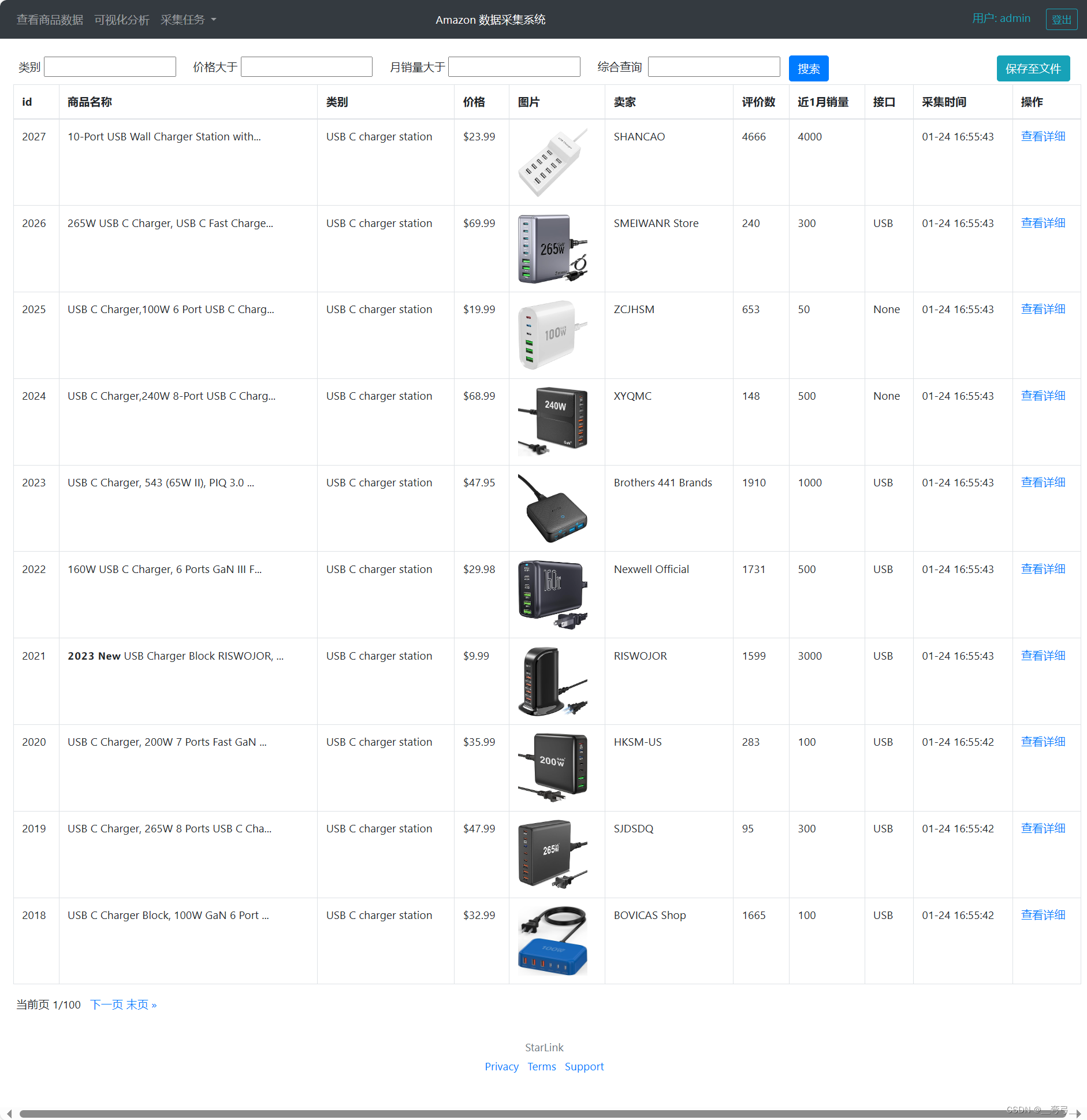如果需要复杂的图表样式,echarts 自带的 series 类型无法满足,那么就可以使用 custom 类型,这时就需要通过 canvas 手动绘制图表的形状了。
知识准备
坐标
假如 echarts 的容器拥有 800*800 尺寸的大小。

那么,左上角是 (0,0 ),右上角是 (800, 0),左下角是 (0, 800),右下角是 (800, 800)。

value() 函数
value() 函数官方说法是根据维度的名称或索引获取对应的数据值。
对于本示例来讲,就是用它获取 x 轴的数据值以及 y 轴的数据值。
获取 X 轴数据值
在本示例中,x 轴类型是 category,所以 value(0) 返回柱子的索引值。

上面一共有三个个柱子,每个柱子都有自己的索引值,从左至右,从 0 开始。
获取 Y 轴数据值
获取 y 轴数据要简单许多,value(1) 会返回每个柱子的数据值,如:100, 50, 20。
coord() 函数
x 和 y 分别是 x 轴的数据值以及 y 轴的数据值。可以通过 value() 来获取。
coord() 函数的作用是根据 x 和 y 轴的数据值计算出坐标点。
renderItem
当 series 的类型为 custom 时,通过 renderItem 函数来绘制每个柱子的样子。伪代码:
const options = {
series: [
{
type: "custom",
data: [100, 50, 20],
renderItem(params, api) {
// ...
}
}
]
}
params 和 api 参考官网:Echarts renderItem
value() 和 coord() 函数就在 api 对象下:api.value()、api.coord()。
在这个 series 下,data 有 3 个数据,那么 renderItem 就会执行 3 次。
对于 data 中的每个数据项,都会调用一次 renderItem。
function renderItem(params, api) {
// ...
return {
// 我只用过 group
type: "group",
// 形状列表
children: [
{
// 已注册的形状名称
type: "shapeName",
// 形状参数,会被传递给 extendShape 函数
shape: {},
// 形状的样式,可以通过 api.style() 函数来获取基础样式
style: api.style(),
// 也可以覆盖某个样式属性,例如单独为每个形状设置不通的背景
style: {
...api.style(),
fill: "red", // 覆盖基础样式中的 fill
}
}
]
}
}
扩展形状
在使用 renderItem 前,必须先使用 echarts.graphic.extendShape 函数来定义形状的样子。
const shapeName = echarts.graphic.extendShape({
buildPath(ctx, shape) {
// ...
}
})
ctx 可以获取到 canvas 的上下文,使用 canvas 来绘制形状。
shape 是使用时传递的 shape 对象数据。参考[renderItem](# 自定义类型)的返回值。
注册形状
要想在 renderItem 中使用形状,需要先扩展形状,最后注册形状。
echarts.graphic.registerShape('shapeName', shapeName);
第二个参数是扩展形状的变量名称,例如[扩展形状](# 扩展形状)中的变量名 shapeName。
基础柱状图

const options = {
title: {
text: "不同级别的忍者数量",
textStyle: {
color: "#fff",
},
},
backgroundColor: "#000",
xAxis: {
type: "category",
data: ["下忍", "中忍", "上忍"],
axisLabel: {
color: "#fff",
},
},
yAxis: {
type: "value",
max: 200,
axisLabel: {
color: "#fff",
},
splitLine: {
lineStyle: {
color: "#222",
},
},
},
tooltip: {
trigger: "axis",
},
series: [
{
type: "bar",
data: [100, 50, 20],
barWidth: 30,
},
],
};
立体柱状图解析

在立体柱状图中,一共有三面:左侧面、右侧面、顶面
中心点:是 coord([value(index, value)]) 计算后的坐标点。
分解

代码实现
function renderItem(params, api) {}
const options = {
series: [
{
type: "custom",
data: [100, 50, 20],
renderItem,
},
],
}
const leftShape = echarts.graphic.extendShape({
buildPath(ctx, shape) {},
});
const rightShape = echarts.graphic.extendShape({
buildPath(ctx, shape) {},
});
const topShape = echarts.graphic.extendShape({
buildPath(ctx, shape) {},
});
echarts.graphic.registerShape("leftShape", leftShape);
echarts.graphic.registerShape("rightShape", rightShape);
echarts.graphic.registerShape("topShape", topShape);
完善 renderItem 函数,获取基础坐标并将坐标传递给自定义形状中:
function renderItem(params, api) {
// 基础坐标
const basicsCoord = api.coord([api.value(0), api.value(1)]);
// 顶部基础 y 轴
const topBasicsYAxis = basicsCoord[1];
// 基础 x 轴
const basicsXAxis = basicsCoord[0];
// 底部 y 轴
const bottomYAxis = api.coord([api.value(0), 0])[1];
return {
type: "group",
children: [
{
type: "leftShape",
shape: {
topBasicsYAxis,
basicsXAxis,
bottomYAxis,
},
style: api.style(),
},
{
type: "rightShape",
shape: {
topBasicsYAxis,
basicsXAxis,
bottomYAxis,
},
style: api.style(),
},
{
type: "topShape",
shape: {
topBasicsYAxis,
basicsXAxis,
bottomYAxis,
},
style: api.style(),
},
],
};
}
const leftShape = echarts.graphic.extendShape({
buildPath(ctx, shape) {
const { topBasicsYAxis, bottomYAxis, basicsXAxis } = shape;
// 侧面宽度
const WIDTH = 15;
// 斜角高度
const OBLIQUE_ANGLE_HEIGHT = 3.6;
const p1 = [basicsXAxis - WIDTH, topBasicsYAxis - OBLIQUE_ANGLE_HEIGHT];
const p2 = [basicsXAxis - WIDTH, bottomYAxis];
const p3 = [basicsXAxis, bottomYAxis];
const p4 = [basicsXAxis, topBasicsYAxis];
ctx.moveTo(p1[0], p1[1]);
ctx.lineTo(p2[0], p2[1]);
ctx.lineTo(p3[0], p3[1]);
ctx.lineTo(p4[0], p4[1]);
},
});
const rightShape = echarts.graphic.extendShape({
buildPath(ctx, shape) {
const { topBasicsYAxis, bottomYAxis, basicsXAxis } = shape;
// 侧面宽度
const WIDTH = 15;
// 斜角高度
const OBLIQUE_ANGLE_HEIGHT = 3.6;
const p1 = [basicsXAxis, topBasicsYAxis];
const p2 = [basicsXAxis, bottomYAxis];
const p3 = [basicsXAxis + WIDTH, bottomYAxis];
const p4 = [basicsXAxis + WIDTH, topBasicsYAxis + OBLIQUE_ANGLE_HEIGHT];
ctx.moveTo(p1[0], p1[1]);
ctx.lineTo(p2[0], p2[1]);
ctx.lineTo(p3[0], p3[1]);
ctx.lineTo(p4[0], p4[1]);
},
});
完善 topShape 形状逻辑:
const topShape = echarts.graphic.extendShape({
buildPath(ctx, shape) {
const { topBasicsYAxis, basicsXAxis } = shape;
// 侧面宽度
const WIDTH = 15;
// 斜角高度
const OBLIQUE_ANGLE_HEIGHT = 3.6;
const p1 = [basicsXAxis, topBasicsYAxis];
const p2 = [basicsXAxis + WIDTH, topBasicsYAxis - OBLIQUE_ANGLE_HEIGHT];
const p3 = [basicsXAxis, topBasicsYAxis - OBLIQUE_ANGLE_HEIGHT * 2];
const p4 = [basicsXAxis - WIDTH, topBasicsYAxis - OBLIQUE_ANGLE_HEIGHT];
ctx.moveTo(p1[0], p1[1]);
ctx.lineTo(p2[0], p2[1]);
ctx.lineTo(p3[0], p3[1]);
ctx.lineTo(p4[0], p4[1]);
},
});
function renderItem(params, api) {
// 柱子索引值
const { seriesIndex } = params;
// 基础坐标
const basicsCoord = api.coord([api.value(seriesIndex), api.value(1)]);
// 顶部基础 y 轴
const topBasicsYAxis = basicsCoord[1];
// 基础 x 轴
const basicsXAxis = basicsCoord[0];
// 底部 y 轴
const bottomYAxis = api.coord([api.value(seriesIndex), 0])[1];
return {
type: "group",
children: [
{
type: "leftShape",
shape: {
topBasicsYAxis,
basicsXAxis,
bottomYAxis,
},
style: {
...api.style(),
fill: new echarts.graphic.LinearGradient(0, 0, 0, 1, [
{ offset: 0, color: "rgba(34, 7, 94, 1)" },
{ offset: 1, color: "rgba(0, 0, 0, 0.26)" },
]), // 覆盖基础样式
},
},
{
type: "rightShape",
shape: {
topBasicsYAxis,
basicsXAxis,
bottomYAxis,
},
style: {
...api.style(),
fill: new echarts.graphic.LinearGradient(0, 0, 0, 1, [
{ offset: 0, color: "rgba(57, 16, 133, 1)" },
{ offset: 1, color: "rgba(0, 0, 0, 0.26)" },
]), // 覆盖基础样式
},
},
{
type: "topShape",
shape: {
topBasicsYAxis,
basicsXAxis,
bottomYAxis,
},
style: {
...api.style(),
fill: "#722ed1", // 覆盖基础样式
},
},
],
};
}
效果图

参考
原文地址:https://blog.csdn.net/qq_35432583/article/details/130658850
本文来自互联网用户投稿,该文观点仅代表作者本人,不代表本站立场。本站仅提供信息存储空间服务,不拥有所有权,不承担相关法律责任。
如若转载,请注明出处:http://www.7code.cn/show_27672.html
如若内容造成侵权/违法违规/事实不符,请联系代码007邮箱:suwngjj01@126.com进行投诉反馈,一经查实,立即删除!







